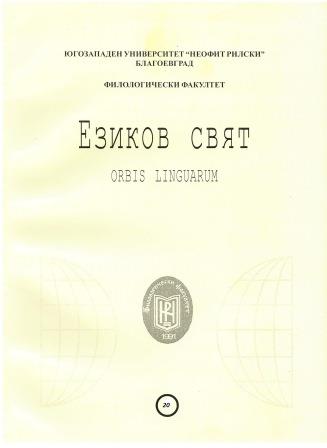ПРИЧАСТИЯТА НА СТРАДАТЕЛНИЯ ПЕРФЕКТ В ГРЪЦКИ И ТЕХНИТЕ ФУНКЦИОНАЛНИ ЕКВИВАЛЕНТИ В БЪЛГАРСКИ (ВЪЗ ОСНОВА НА ПРЕВОДЕН КОРПУС)
THE PARTICIPLES OF THE PASSIVE PERFECT IN GREEK AND THEIR FUNCTIONAL EQUIVALENTS IN BULGARIAN (BASED ON A TRANSLATION CORPUS)
Author(s): Desislava Yordanova-PetrovaSubject(s): Language and Literature Studies, Theoretical Linguistics, Morphology, Comparative Linguistics, Translation Studies
Published by: ЮГОЗАПАДЕН УНИВЕРСИТЕТ »НЕОФИТ РИЛСКИ«
Keywords: participles of passive perfect; functional equivalents; dominant functional equivalent
Summary/Abstract: This paper focuses on the participles of the passive perfect in the Greek language and their functional equivalents in Bulgarian translations. For the purposes of the study, a translation corpus was used, consisting of 500 forms of the Greek participles of the passive perfect. The examples are excerpted from five books by Greek authors, translated into Bulgarian by professional translators. The results of the research show that the dominant functional equivalent of the Greek participle of the passive perfect in the Bulgarian language is quite naturally the past passive participle. Yet, although both languages have the category of past passive participles, with similar meanings and functions, in the course of the study it turned out that only about half of the forms of participles in Greek are rendered into Bulgarian with the same type of participles. The other main functional equivalents of the Greek participles of the passive perfect are adjectives and past perfect active participles, and in rare cases adverbs, nouns, verbs, other participles and prepositional phrases are used. The present study once again illustrates the fact that comparative research has always been and will continue to be a reliable tool for a more systematic and comprehensive study of the meanings and functions of certain linguistic phenomena, something that is not always achievable in a single language.
Journal: Езиков свят - Orbis Linguarum
- Issue Year: 20/2022
- Issue No: 1
- Page Range: 044-050
- Page Count: 7
- Language: Bulgarian

